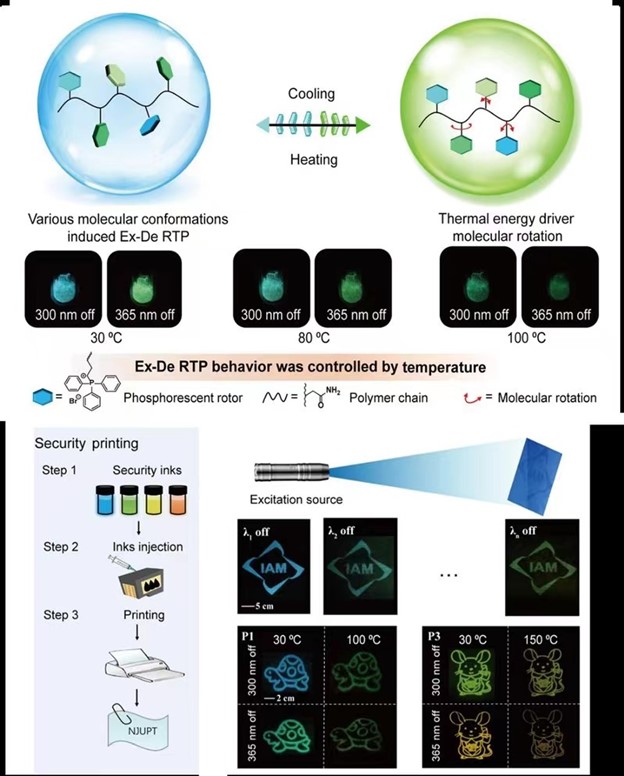Recently, the team of Academician Huang Wei, Professor Zhao Qiang and Professor Ma Yun from the School of Materials Science and Engineering of Nanjing University of Posts and Telecommunications, the State Key Laboratory of Organic Electronics and Information Display made new progress in the field of organic intelligent photoelectric materials, and realized the dynamic regulation of the response behavior of organic intelligent photoelectric materials through the orthogonal stimulation of the external field, and explored its application in the field of optical information anti-counterfeiting. On February 6th, the related achievements were published in the international academic journal Nature Communications with the title of “Conformation-dependent Dynamic Organic Phosphorescence Through Thermal Energy Driven Molecular Rotations”. After the publication of this research, it aroused widespread concern. At the invitation of Nature Portfolio Communities of Nature Group, the research team wrote in the column “Behind the Paper” to share the research experience. Academician Huang Wei, Professor Zhao Qiang and Professor Ma Yun of the Key Laboratory are co-authors, and Dr. Wei Juan is the first author of the paper.
In recent years, scholars at home and abroad have made remarkable progress in developing organic intelligent photoelectric materials that are responsive to external stimuli such as light, heat, force and electricity, and have realized their applications in optical and optoelectronic fields such as information display, security anti-counterfeiting, and biological imaging. It is of great significance to realize the dynamic regulation of the response behavior of this kind of organic intelligent photoelectric materials to improve their photoelectric properties, which is one of the main research directions in this field. However, the current strategies for regulating the response behavior of organic intelligent photoelectric materials are mainly based on chemical structure modification, which makes it difficult to switch dynamically and quickly in the application process. It is a major challenge to realize the dynamic regulation of the response behavior of organic intelligent photoelectric materials.
Aiming at this key scientific problem, the team led by Academician Huang Wei, Professor Zhao Qiang and Professor Ma Yun copolymerized the phosphorescent molecular rotor with acrylamide as monomer and developed a series of organic room temperature phosphorescent polymers. Because the aromatic groups on the phosphorescent molecular rotor can rotate freely, they will present different molecular structures in the polymer, which directly affects the triplet excited state properties of each phosphorescent monomer. Therefore, the prepared organic room temperature phosphorescent polymers show different phosphorescent colors under different wavelength excitation. Furthermore, the molecular structure of phosphorescent monomer can be changed by driving the molecular rotor to rotate through external thermal stimulation, and the response behavior of excitation wavelength-dependent luminescence can be changed, thus realizing dynamic regulation of response behavior. Finally, the team members explored the application of this kind of organic intelligent photoelectric materials in the field of optical information anti-counterfeiting. The research results have important guiding significance for the development of organic intelligent photoelectric materials whose response behavior can be dynamically regulated, and will also promote this kind of materials to make breakthrough progress in the photoelectric fields such as information display, information security and information sensing.
This work is supported by the National Science Foundation for Outstanding Young Scholars, the National Basic Science Center Project, the General Project of the National Natural Science Foundation, the Key Support Project of distinguished professor, Jiangsu Province and the Outstanding Youth Fund Project of Jiangsu Province.

Organic intelligent photoelectric material with dynamically regulable response behavior and its optical anti-counterfeiting application
(Writer: Ma Yun Preliminary Reviewer: Zhao Yunyu Editor: Wang Cunhong Final Reviewer: Zhang Feng)



